In today’s fast-paced mobile ecosystem, relying solely on manual testing is like navigating a highway on a bicycle-slow, risky, and unsustainable. Users expect flawless, high-performance apps, and the pressure to ship updates and fixes faster than ever is immense. This is where the right mobile app testing automation tools become a game-changer for development teams, from React Native developers to enterprise QA leads.
Automation not only accelerates release cycles but also expands test coverage, improves accuracy, and frees up your QA team to focus on complex, exploratory testing. From ensuring UI consistency across thousands of devices to validating performance under real-world network conditions, these tools are the bedrock of a modern, agile development pipeline. The financial benefits of adopting such automation strategies are substantial. Discover more about how software testing saves money by catching issues early, preventing costly fixes later in the development cycle.
This guide cuts through the noise to help you find the best platform for your specific needs. We’ll dive into a curated list of the top 12 tools, complete with screenshots, direct links, and a clear breakdown of their features, ideal use cases, and limitations. Whether you’re a DevOps engineer, a product manager, or part of a security-conscious organization, this resource will equip you to make an informed decision and elevate your quality assurance strategy.
1. CodePushGo
CodePushGo emerges as a powerful, specialized platform for React Native development teams looking to accelerate their release cycles and enhance testing agility. While not a traditional test execution framework, its role in the mobile app testing automation tools ecosystem is pivotal. It enables instant, over-the-air (OTA) code deployments, allowing QA teams to bypass lengthy app store review queues and push bug fixes or test new features in a live environment within minutes. This capability fundamentally transforms how teams approach regression testing, hotfixes, and A/B testing, making it an indispensable asset for continuous delivery.
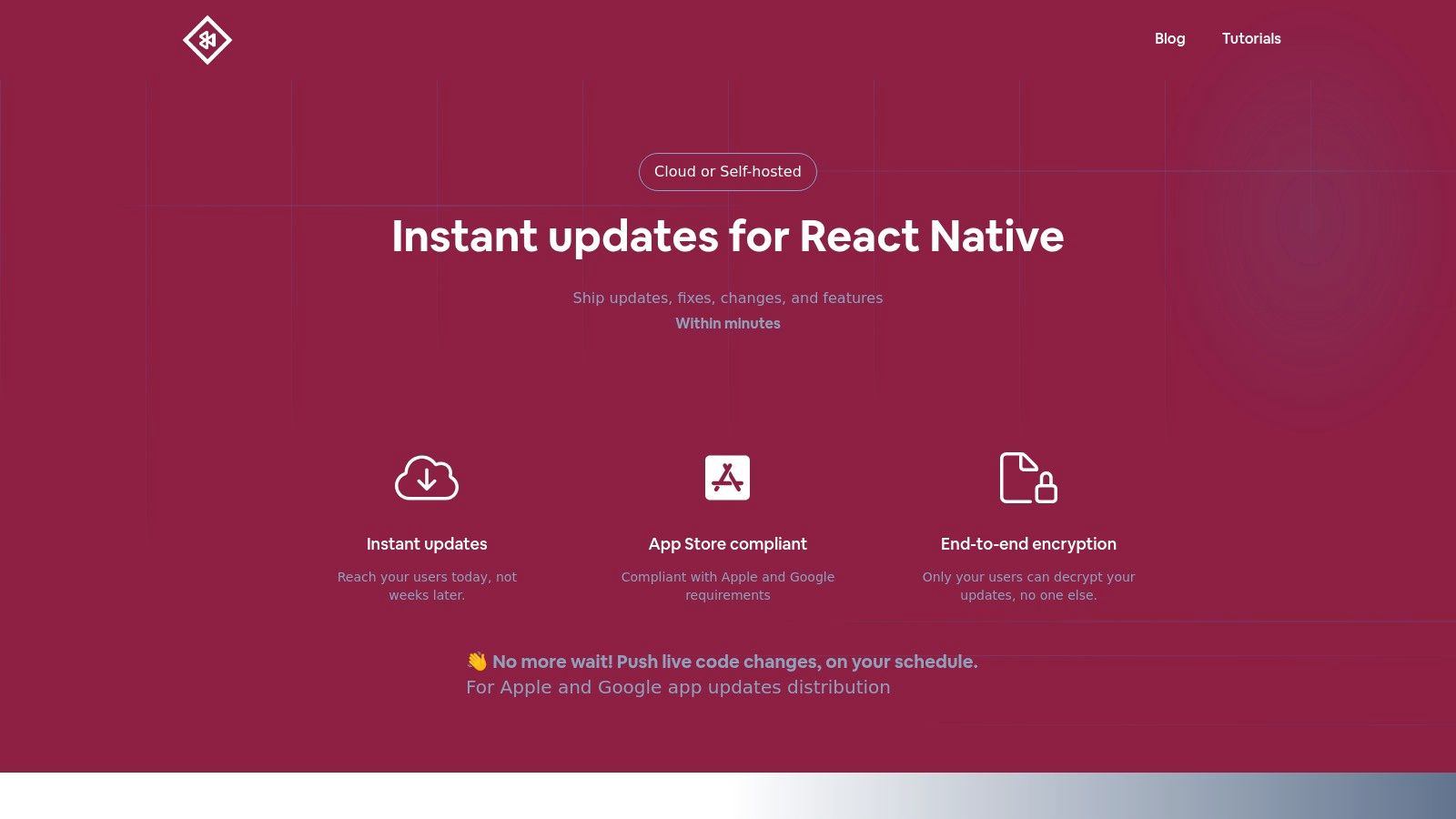
Its architecture is built for security and efficiency, featuring enterprise-grade end-to-end encryption to protect code integrity. The platform’s smart differential updates minimize bandwidth by sending only the changed code, a critical feature for users with limited connectivity. For testing, the granular channel controls are a standout, allowing teams to create specific channels for QA, beta testers, or even specific user segments, ensuring new code is validated by the right audience before a full rollout.
Key Features & Use Cases
- Rapid Hotfix Deployment: When a critical bug is found post-release, CodePushGo allows developers to deploy a patch directly to users’ devices, skipping the 1-3 day app store review. This is invaluable for maintaining app stability and user trust.
- Staged Rollouts & A/B Testing: Teams can release a new feature to a small percentage of users (e.g., 5%) and monitor performance and stability analytics in real-time. This controlled exposure minimizes risk and provides data-driven feedback before a full-scale launch.
- CI/CD Integration: Seamlessly integrates with tools like Jenkins and GitHub Actions, automating the entire OTA update process from code commit to deployment, making it a natural extension of any modern DevOps pipeline.
- Enhanced Security: With end-to-end encryption and the option for self-hosting, CodePushGo meets the stringent security requirements of enterprise applications, ensuring that update packages cannot be intercepted or tampered with.
Best for: React Native teams focused on agile development, continuous delivery, and rapid iteration. It is particularly effective for organizations that need to deploy frequent updates, conduct live A/B testing, and respond instantly to production issues.
Pros:
- Instant, compliant OTA updates eliminate app store delays.
- End-to-end encryption provides maximum security.
- Smart differential updates reduce bandwidth usage.
- Seamless integration with popular CI/CD pipelines.
- Granular controls for staged and targeted rollouts.
Cons:
- Primarily focused on the React Native ecosystem.
- Initial setup fee ($2,600) plus CI/CD costs may be a barrier for smaller teams.
Website: https://codepushgo.com
2. BrowserStack – App Automate
BrowserStack’s App Automate is a dominant player in the cloud-based mobile app testing automation tools space, offering an expansive real device cloud that is hard to match. Its primary strength lies in providing teams instant access to over 30,000 real iOS and Android device combinations, eliminating the high cost and maintenance burden of an in-house device lab. This platform is ideal for organizations that prioritize comprehensive device coverage to ensure their native or hybrid applications perform flawlessly across a fragmented market.
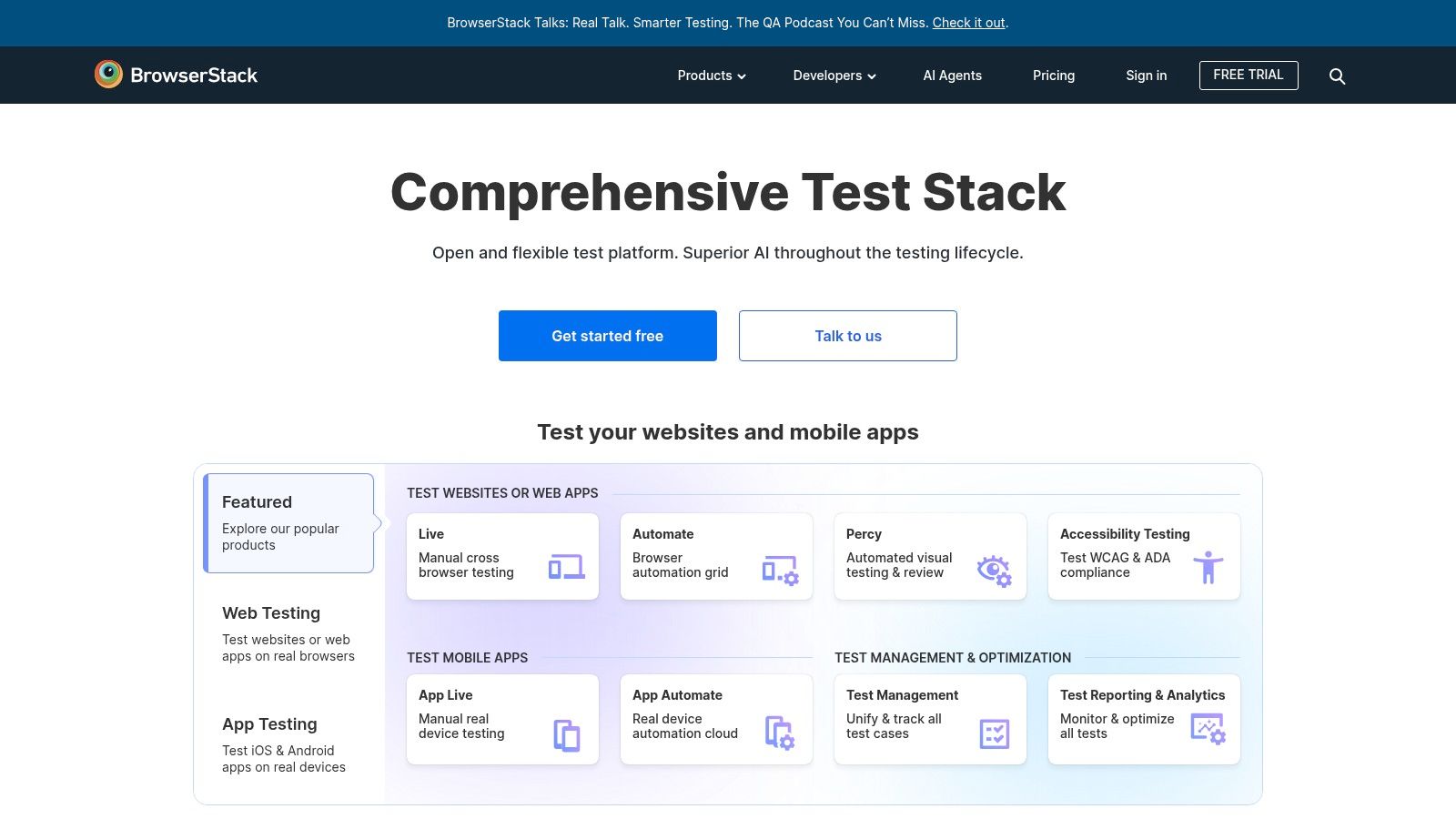
It seamlessly integrates with popular frameworks like Appium, Espresso, and XCUITest, allowing developers and QA engineers to run their existing test suites on real devices with minimal configuration changes. The platform excels at parallel testing, significantly reducing execution times and providing rich debugging artifacts like video recordings, device logs, and screenshots for rapid issue resolution.
Key Details & Use Cases
- Best For: Teams needing extensive real device coverage and robust CI/CD integration.
- Standout Feature: The sheer scale of its real device cloud ensures you can test on nearly any device your users have, including the very latest models.
- Implementation Tip: Utilize BrowserStack’s secure local tunneling feature to test pre-production apps on internal development or staging environments before they go live.
- Integrations: Offers mature plugins for Jenkins, GitHub Actions, Azure DevOps, and more, making it a powerful addition to any CI/CD pipeline.
| Feature | Details |
|---|---|
| Frameworks | Appium, Espresso, XCUITest, EarlGrey |
| Device Access | 30,000+ real iOS and Android devices, plus emulators/simulators |
| Pros | Unmatched device/OS coverage, excellent documentation, strong CI/CD support |
| Cons | Pricing for parallel runs can become expensive, dedicated private devices are a premium-tier feature |
| Pricing | Starts at $199/month (billed annually) for one parallel test; enterprise plans available. |
Website: https://www.browserstack.com/
3. Sauce Labs – Real Device Cloud and Mobile App Testing
Sauce Labs is a veteran in the cloud testing market, offering a robust platform among mobile app testing automation tools designed for enterprise-grade needs. It provides a comprehensive solution that combines a vast real device cloud with emulators and simulators, catering to the full spectrum of the development lifecycle. The platform is highly regarded for its reliability, security, and deep diagnostic capabilities, making it a go-to choice for large organizations where compliance and detailed test insights are non-negotiable.
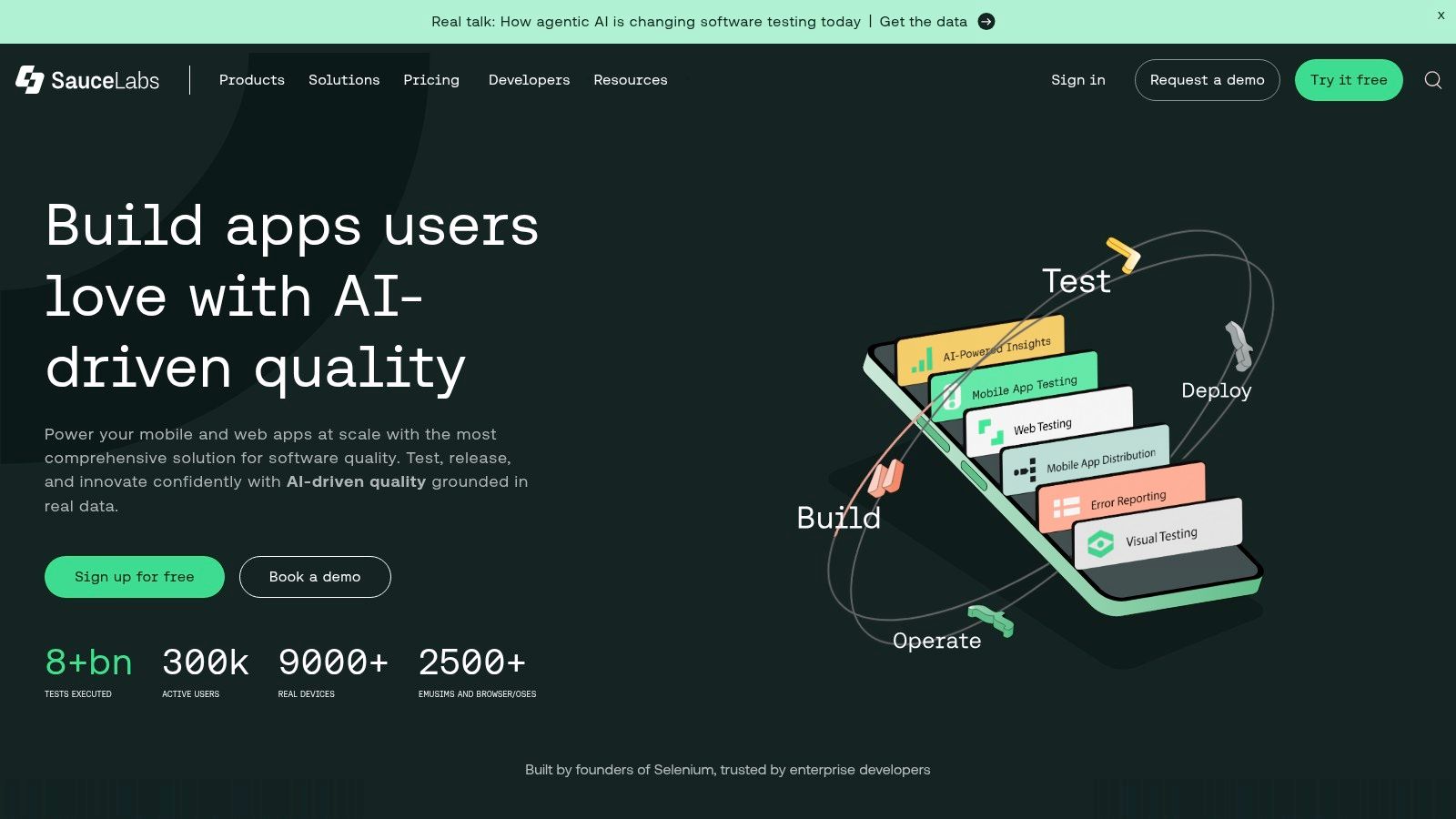
Supporting Appium, Espresso, and XCUITest, Sauce Labs allows teams to execute both manual and automated tests in parallel, drastically accelerating release cycles. Its strength lies in providing rich, actionable feedback, including crash reports, network capture, and real-time device vitals. This detailed data helps teams quickly identify and resolve complex bugs that might only appear under specific device or network conditions, ensuring high-quality application delivery.
Key Details & Use Cases
- Best For: Enterprise teams requiring a secure, compliant, and highly scalable testing solution with advanced diagnostics.
- Standout Feature: The combination of real device testing with in-depth analytics like device vitals and error reporting provides a holistic view of app performance.
- Implementation Tip: Use their emulators and simulators for rapid, early-cycle testing and then transition to the real device cloud for pre-release validation to optimize cost and speed.
- Integrations: Features powerful integrations with popular CI/CD tools such as Jenkins, Jira, Slack, and GitHub, embedding seamlessly into existing DevOps workflows.
| Feature | Details |
|---|---|
| Frameworks | Appium, Espresso, XCUITest |
| Device Access | Thousands of real devices (public and private pools), plus emulators/simulators |
| Pros | Robust parallelization, comprehensive enterprise security, strong support for live and automated testing |
| Cons | The complex feature set can be overwhelming for small teams, private device access often needs direct sales contact |
| Pricing | Live testing plans start at $50/month. Automated testing plans and enterprise pricing available upon request. |
Website: https://saucelabs.com/
4. AWS Device Farm
AWS Device Farm is a cloud-based service that leverages the power of Amazon’s infrastructure to offer access to a large fleet of real iOS and Android devices. As one of the more flexible mobile app testing automation tools, its primary appeal is its pay-as-you-go model, which makes it highly cost-effective for teams with variable or infrequent testing needs. This platform is an excellent fit for organizations already invested in the AWS ecosystem, offering seamless integration with other AWS services.
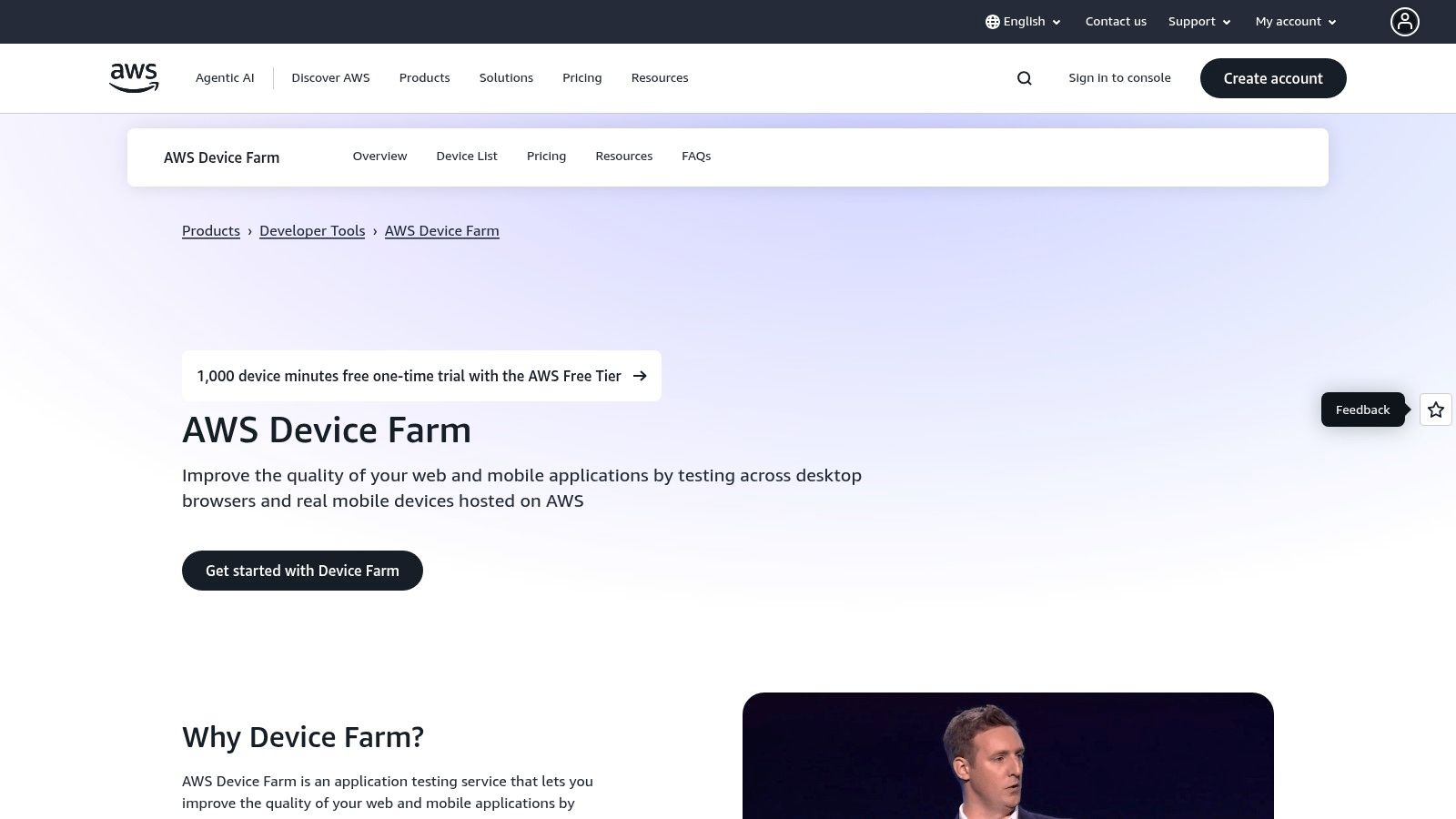
It supports popular open-source frameworks like Appium, Espresso, and XCUITest, allowing you to run your tests in parallel across multiple real devices. While its user interface and reporting capabilities are more basic compared to specialized vendors, its reliability and scalability are backed by AWS’s robust infrastructure. For a deeper dive into its capabilities, you can explore ways to automate Android testing using AWS Device Farm.
Key Details & Use Cases
- Best For: Teams in the AWS ecosystem or those needing a cost-effective, pay-per-minute real device testing solution.
- Standout Feature: The flexible pricing model, which includes a free tier and pay-per-device-minute options, is perfect for startups and projects with fluctuating workloads.
- Implementation Tip: Leverage the AWS CLI to programmatically schedule test runs and pull reports, fully integrating Device Farm into your automated CI/CD pipelines.
- Integrations: Natively integrates with AWS CodePipeline, Jenkins, and other CI tools, making it a natural extension for developers using the AWS cloud.
| Feature | Details |
|---|---|
| Frameworks | Appium, Espresso, XCUITest, Calabash |
| Device Access | Large, shared fleet of real iOS and Android devices; private (dedicated) device options available |
| Pros | Cost-effective for variable workloads, reliable AWS infrastructure, easy to start via AWS Management Console |
| Cons | Reporting and UI are less feature-rich than competitors, requires careful management of device slots |
| Pricing | Free tier available; pay-as-you-go starts at $0.17/device minute; unlimited testing plans from $250/month. |
Website: https://aws.amazon.com/device-farm/
5. Firebase Test Lab (Google Cloud)
Google’s Firebase Test Lab is a cloud-based infrastructure that offers a streamlined approach to mobile testing, particularly for Android applications. It’s one of the most practical mobile app testing automation tools for teams already invested in the Google Cloud and Firebase ecosystem. The platform allows you to run automated tests on a wide range of real and virtual devices hosted in Google’s data centers, providing a scalable and cost-effective way to validate app quality without managing physical hardware.
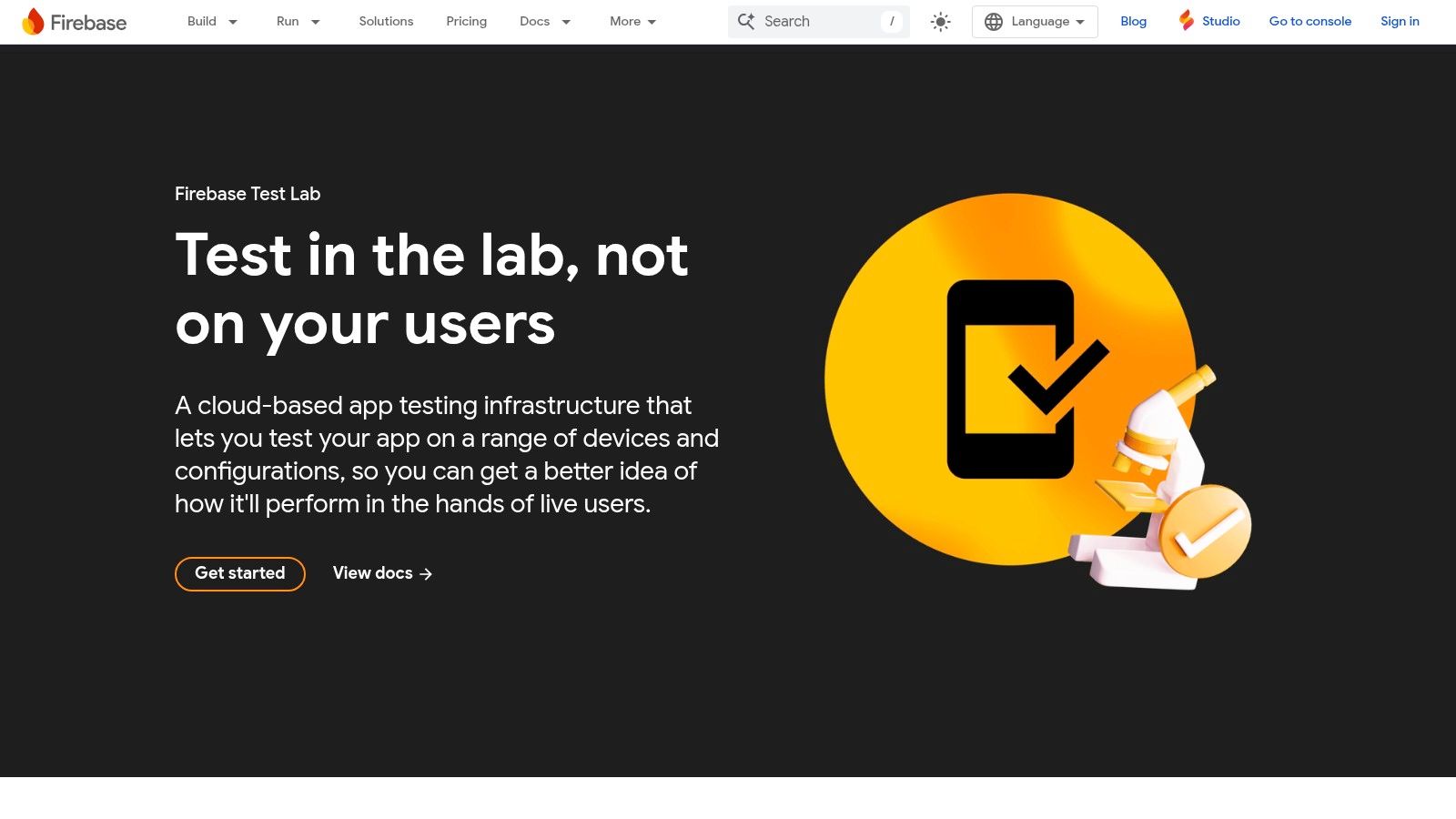
Its biggest advantage is the deep integration with Android Studio, Gradle, and other Google Cloud services. This makes it incredibly simple for Android developers to trigger tests directly from their development environment or CI pipeline. The platform supports native Android tests (Espresso and UI Automator) and even includes an intelligent “Robo test” that crawls your app automatically to find crashes, making it accessible even for teams without extensive test suites.
Key Details & Use Cases
- Best For: Android-first development teams looking for a cost-effective, deeply integrated testing solution.
- Standout Feature: The “Robo test” provides automated, intelligent app crawling to identify basic crashes and UI issues with zero script writing required.
- Implementation Tip: Take advantage of the generous free daily quotas on the Spark (free) and Blaze (pay-as-you-go) plans for pull request validation and pre-merge checks.
- Integrations: Natively integrates with Android Studio, Google Cloud Build, Jenkins, and has a gcloud CLI for custom CI/CD setups.
| Feature | Details |
|---|---|
| Frameworks | Espresso, UI Automator, Robo test (Android), XCUITest (iOS - Beta) |
| Device Access | A wide range of virtual and physical Android devices; limited iOS physical devices in beta |
| Pros | Highly cost-effective for Android tests, seamless integration with the Google/Firebase ecosystem |
| Cons | Limited iOS support and device variety, less comprehensive reporting compared to competitors |
| Pricing | Offers a generous free tier; pay-as-you-go pricing is $5/device hour for physical and $1/device hour for virtual. |
Website: https://firebase.google.com/products/test-lab
6. SmartBear BitBar
SmartBear BitBar is a flexible cloud platform that stands out among mobile app testing automation tools with its unique unlimited testing minutes model. This approach provides predictable costs for teams running a high volume of tests on real mobile devices and browsers. It is particularly well-suited for organizations already invested in the SmartBear ecosystem, as it offers deep integration with tools like TestComplete, alongside support for popular open-source frameworks.
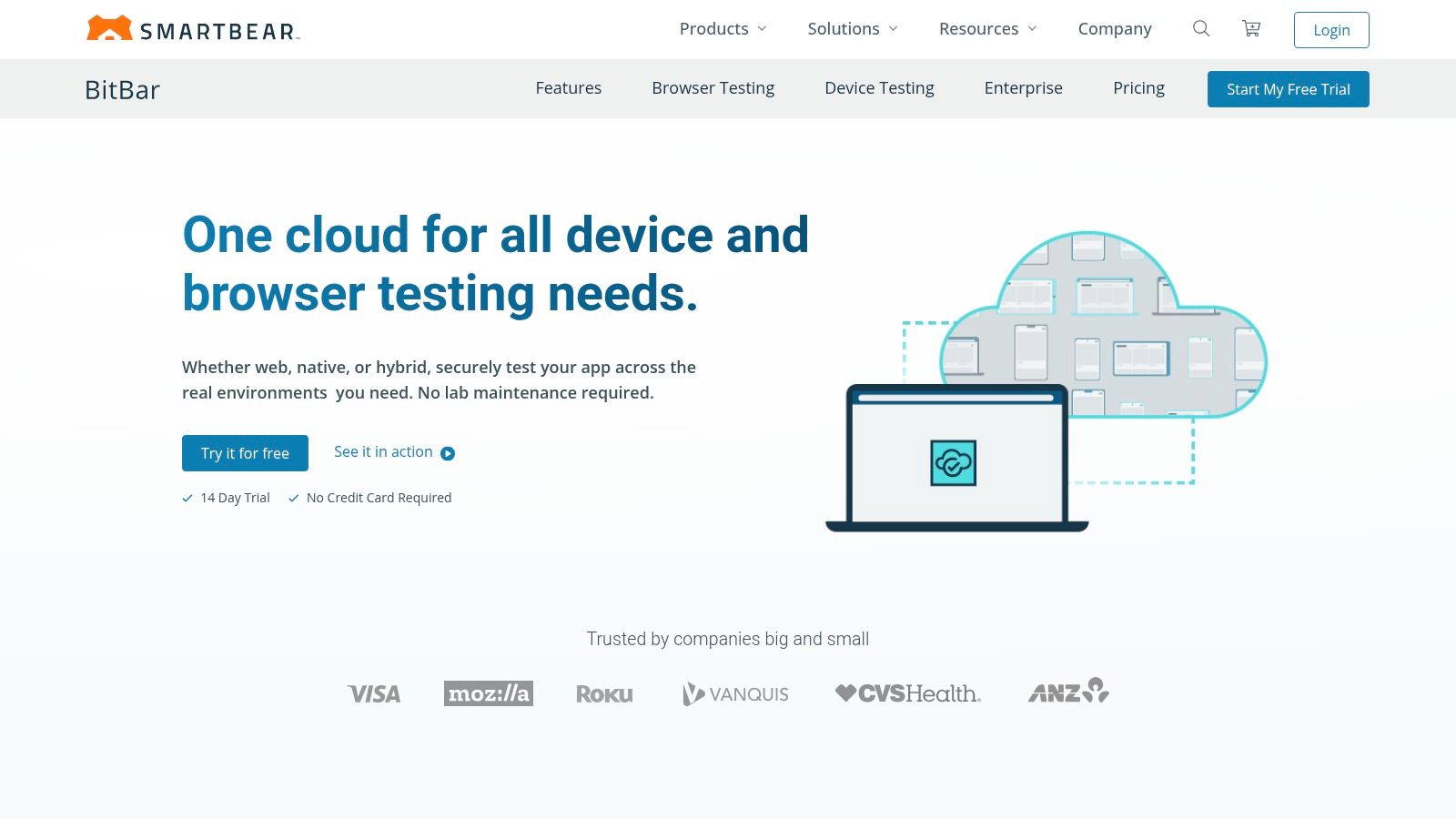
The platform supports both automated and live testing, enabling parallel test execution to accelerate release cycles. BitBar’s strength lies in its ability to provide a cost-effective solution for continuous testing without worrying about per-minute charges. This makes it an attractive option for teams looking to maximize their test automation efforts within a fixed budget. It also offers enterprise-grade features like private device clouds for enhanced security and performance.
Key Details & Use Cases
- Best For: Teams needing a predictable, high-volume testing budget, especially those using SmartBear’s TestComplete.
- Standout Feature: The unlimited testing minutes model across all plans eliminates surprise costs and encourages extensive test execution.
- Implementation Tip: Leverage the TestComplete integration to bridge script-based and scriptless automation, allowing less technical team members to contribute to testing on real devices. BitBar also works well with many popular CI/CD platforms to streamline development.
- Integrations: Native integration with TestComplete, ReadyAPI, and common CI/CD tools like Jenkins, TeamCity, and Bamboo.
| Feature | Details |
|---|---|
| Frameworks | Appium, Selenium, Espresso, XCUITest, Calabash, and native TestComplete support |
| Device Access | Hundreds of real iOS and Android devices, plus desktop browsers |
| Pros | Predictable pricing with unlimited minutes, strong integration with other SmartBear products |
| Cons | The user interface has a steeper learning curve, enterprise features can require custom pricing |
| Pricing | Public cloud plans start at $129/month (billed annually) for one parallel test; private plans available. |
Website: https://smartbear.com/product/bitbar/
7. Perfecto by Perforce
Perfecto by Perforce is an enterprise-grade platform that delivers a robust cloud-based lab for both real and virtual devices. It stands out by combining comprehensive testing capabilities with powerful, AI-driven analytics, positioning it as one of the top-tier mobile app testing automation tools for large organizations. The platform excels in providing deep insights into test failures, performance bottlenecks, and user experience issues through detailed reporting and health dashboards, catering to teams that require stringent compliance and quality standards.
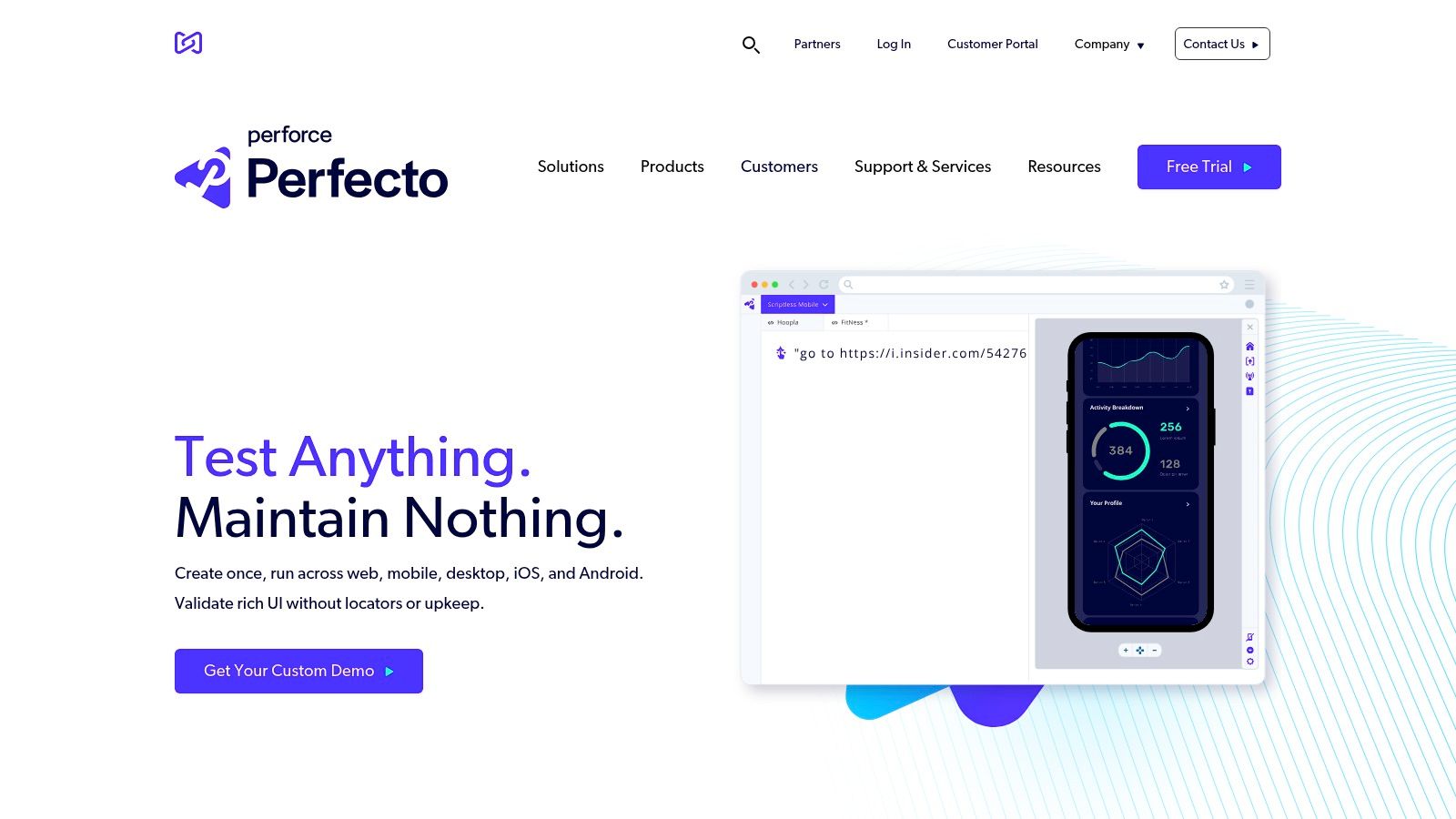
Perfecto supports traditional frameworks like Appium and Selenium but also offers scriptless testing options, broadening its accessibility to both technical and non-technical team members. Its focus on security, reliability, and advanced features like accessibility and visual validation makes it a go-to solution for enterprises in regulated industries such as finance and healthcare that cannot afford to compromise on quality.
Key Details & Use Cases
- Best For: Large enterprise teams needing in-depth reporting, security, and both scripted and scriptless testing options.
- Standout Feature: AI-assisted analytics provide intelligent test failure analysis, helping teams quickly identify the root cause of issues and reduce debugging time.
- Implementation Tip: Leverage the platform’s visual validation to catch UI defects that functional tests might miss, ensuring brand consistency across devices.
- Integrations: Seamlessly integrates with major CI/CD tools like Jenkins, Azure DevOps, and Jira, enabling continuous testing within existing workflows.
| Feature | Details |
|---|---|
| Frameworks | Appium, Selenium, XCUITest, Espresso, Flutter, Quantum (BDD) |
| Device Access | Cloud-based real and virtual iOS/Android devices, with options for private and dedicated clouds |
| Pros | Comprehensive analytics and reporting, strong security and compliance features, supports scriptless testing |
| Cons | Pricing and feature set can be excessive for small teams, advanced features locked behind higher tiers |
| Pricing | Offers custom pricing based on usage and features; contact sales for a quote. |
Website: https://www.perfecto.io/
8. LambdaTest – Real Device Cloud for Mobile Automation
LambdaTest has emerged as a strong contender among mobile app testing automation tools, offering a versatile cloud grid that caters to both web and mobile testing needs. Its platform provides a comprehensive mix of real iOS and Android devices alongside a wide array of emulators and simulators. This makes it an attractive, cost-competitive option for teams looking for a unified testing environment without the overhead of maintaining physical devices, especially those who need to validate performance across web and native app platforms simultaneously.
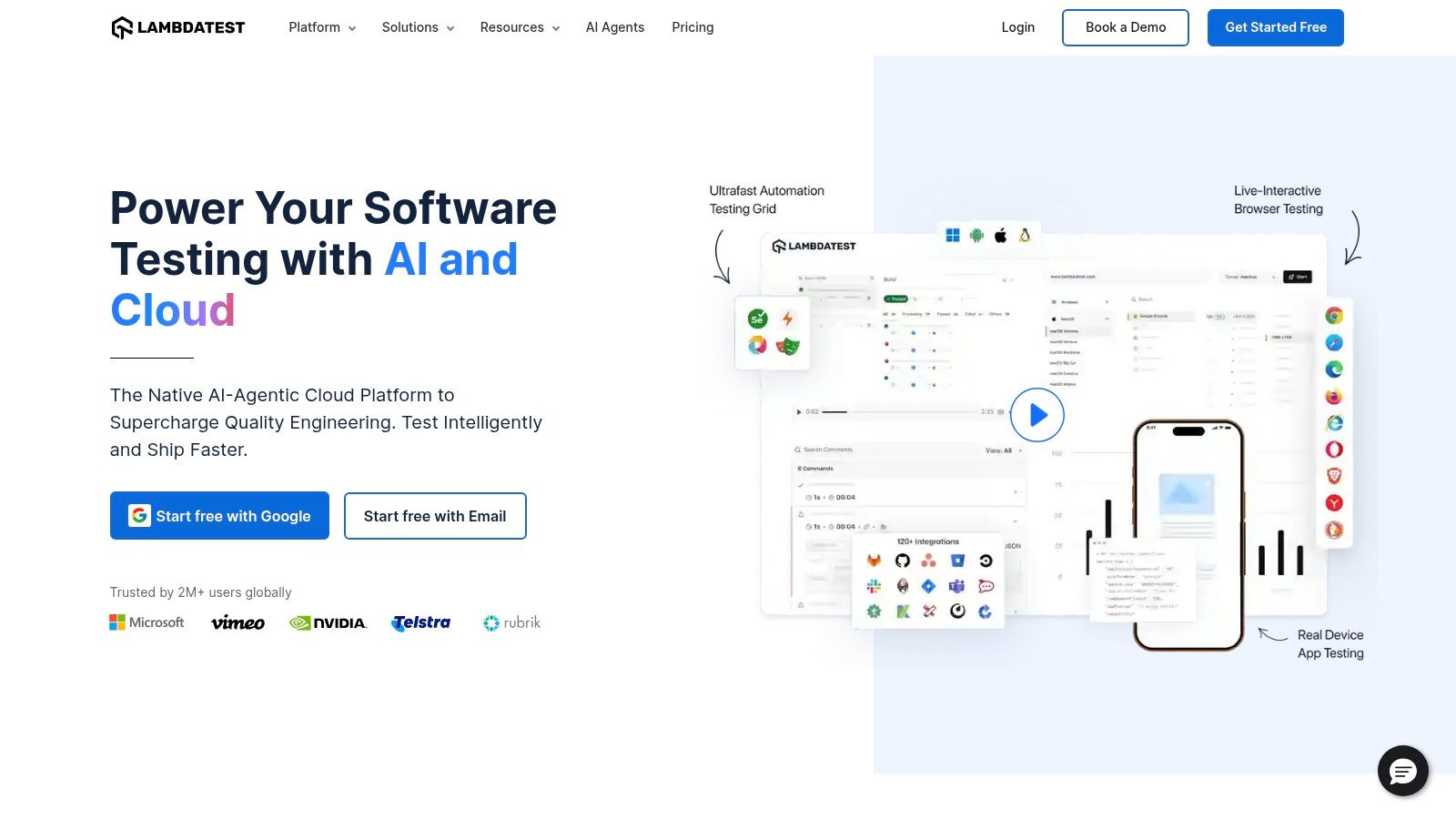
The platform supports popular frameworks like Appium and Espresso, allowing for smooth integration into existing automation workflows. LambdaTest provides essential debugging tools, including device logs, network logs, video recordings, and screenshots, which help developers and QA engineers quickly identify and resolve issues. Its focus on providing a single solution for various testing types, from manual to automated, makes it a practical choice for growing teams.
Key Details & Use Cases
- Best For: Teams seeking a budget-friendly, integrated cloud solution for both web and mobile app testing.
- Standout Feature: The unified platform approach allows you to manage web, app, and visual regression testing from a single dashboard, simplifying toolchain management.
- Implementation Tip: Take advantage of the free trial minutes to run initial test suites and evaluate device performance and stability before committing to a paid plan.
- Integrations: Connects seamlessly with CI/CD tools like Jenkins, CircleCI, and GitLab, as well as project management tools like Jira and Asana.
| Feature | Details |
|---|---|
| Frameworks | Appium, Espresso, XCUITest |
| Device Access | Real iOS and Android devices, plus a large pool of emulators/simulators |
| Pros | Affordably priced entry plans, integrated platform for web and mobile testing, strong debugging features |
| Cons | Pricing and feature configurations can change; some advanced capabilities require add-ons |
| Pricing | Free plan available; paid plans for real devices start at $25/month for one parallel test. |
Website: https://www.lambdatest.com/
9. Kobiton
Kobiton positions itself as a versatile mobile experience platform, offering a powerful blend of real-device testing, scriptless AI-driven automation, and flexible deployment models. Its core value proposition is catering to diverse team needs, from startups requiring quick access to a public device cloud to enterprises needing secure, on-premise or private cloud solutions. This adaptability makes it one of the more flexible mobile app testing automation tools available.
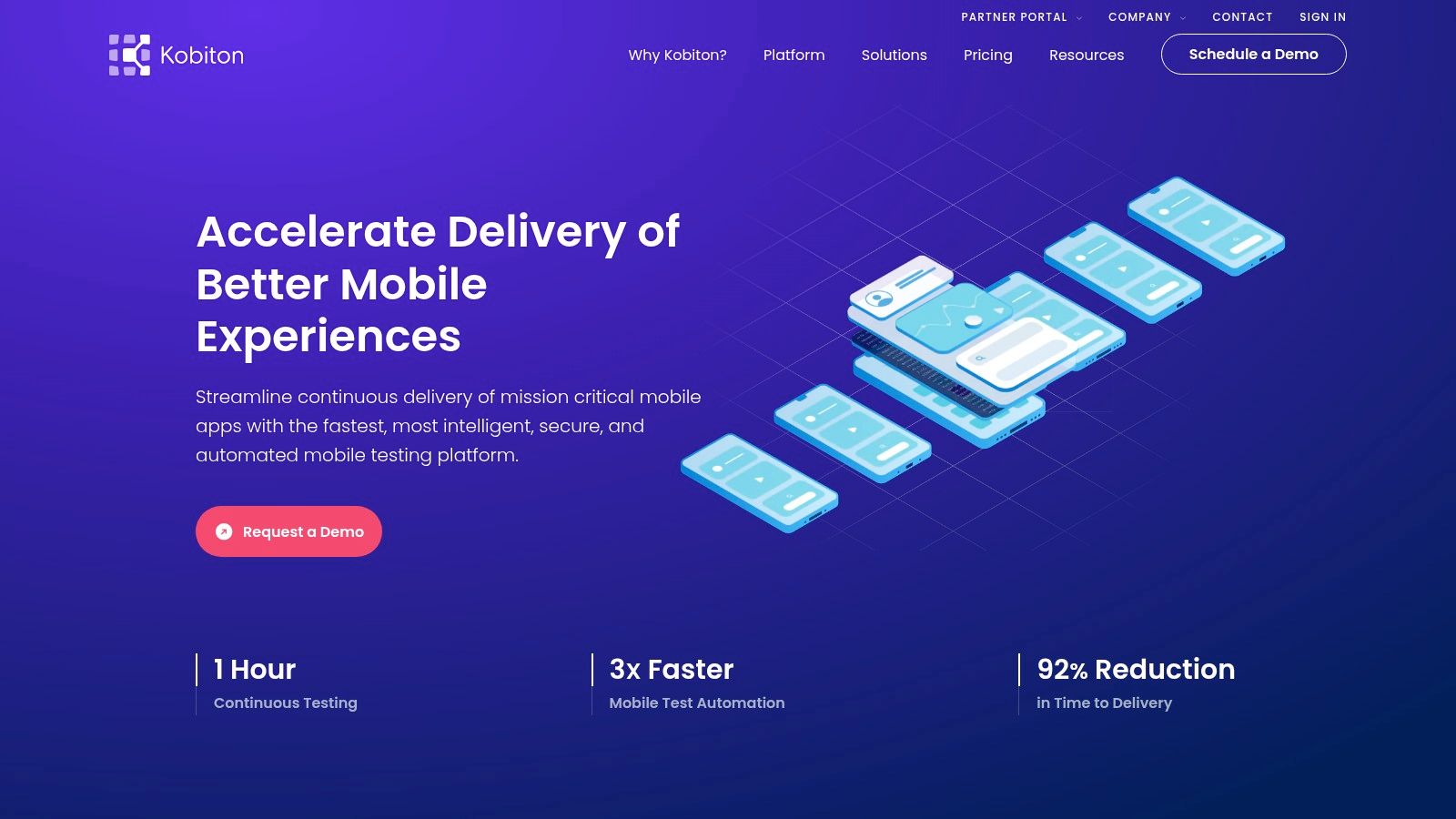
The platform supports both traditional scripted testing with frameworks like Appium and XCUITest and an innovative scriptless approach. Kobiton’s AI can automatically generate and execute tests, and even “self-heal” broken Appium scripts, which helps reduce test maintenance overhead. This dual approach allows manual testers to contribute to automation efforts while empowering developers with robust scripted solutions.
Key Details & Use Cases
- Best For: Teams seeking a mix of scriptless and scripted automation, or those with specific security needs requiring private/on-premise deployment.
- Standout Feature: AI-powered script generation and self-healing capabilities provide a bridge between manual testing and full-scale automation.
- Implementation Tip: Use the Device Lab Management feature to integrate your company’s existing internal devices into the Kobiton platform for centralized access and management.
- Integrations: Connects seamlessly with Jenkins, Jira, GitHub, Azure DevOps, and other popular CI/CD and project management tools.
| Feature | Details |
|---|---|
| Frameworks | Appium, Espresso, XCUITest, Scriptless AI |
| Device Access | Real devices on a public cloud, dedicated devices, and on-premise/private cloud options |
| Pros | Flexible deployment and pricing models, good balance of scriptless and scripted testing |
| Cons | Minute-based plans require careful usage monitoring, some enterprise features require sales engagement |
| Pricing | Starts with a free trial; paid plans begin at $75/month for individuals, with team and enterprise plans available. |
Website: https://kobiton.com/
10. HeadSpin
HeadSpin distinguishes itself among mobile app testing automation tools by uniting functional, performance, and user experience testing on a global real device infrastructure. It offers a unique platform designed to capture and analyze complex user journeys, providing deep, AI-driven insights into app performance, network behavior, and audio/video quality. This makes it an invaluable tool for organizations that need to understand not just if their app works, but how well it performs under real-world conditions across different global networks.

The platform provides a comprehensive suite of diagnostic data, including detailed performance waterfalls and network packet captures, all synchronized with the test video. This allows teams to pinpoint the root cause of issues, from slow API calls to rendering delays. With strong support for Appium and Selenium, HeadSpin helps enterprises proactively identify and resolve performance bottlenecks before they impact end-users, ensuring a high-quality digital experience.
Key Details & Use Cases
- Best For: Global enterprises focused on integrated performance and functional testing, especially for media-heavy or IoT-enabled applications.
- Standout Feature: Its ability to capture and analyze network traffic and performance KPIs alongside functional test execution provides a holistic view of app quality.
- Implementation Tip: Leverage the KPI dashboards to establish performance benchmarks and track regressions across builds to maintain a consistently high-quality user experience.
- Integrations: Deep integration with the Appium ecosystem, along with support for major CI/CD tools like Jenkins, CircleCI, and Azure DevOps.
| Feature | Details |
|---|---|
| Frameworks | Appium, Selenium, XCUITest, Espresso, and more |
| Device Access | Global real device cloud, with options for public, private, and on-premise deployments |
| Pros | Excellent for integrated functional and performance diagnostics, strong contributor to the Appium ecosystem |
| Cons | Pricing is variable and can be complex, may be more powerful than needed for basic functional tests |
| Pricing | Custom pricing based on usage and deployment model; contact sales for a quote. |
Website: https://www.headspin.io/
11. Applitools – Visual AI and Ultrafast Grid
Applitools shifts the focus of mobile app testing automation tools from code-based assertions to AI-powered visual validation. Its strength is in catching visual regressions and UI bugs that traditional functional tests often miss. The platform’s Visual AI intelligently identifies meaningful UI changes while ignoring insignificant pixel differences, dramatically reducing the false positives that plague screenshot comparison testing. This approach is ideal for teams looking to ensure a visually perfect user experience across every release without drowning in test maintenance.
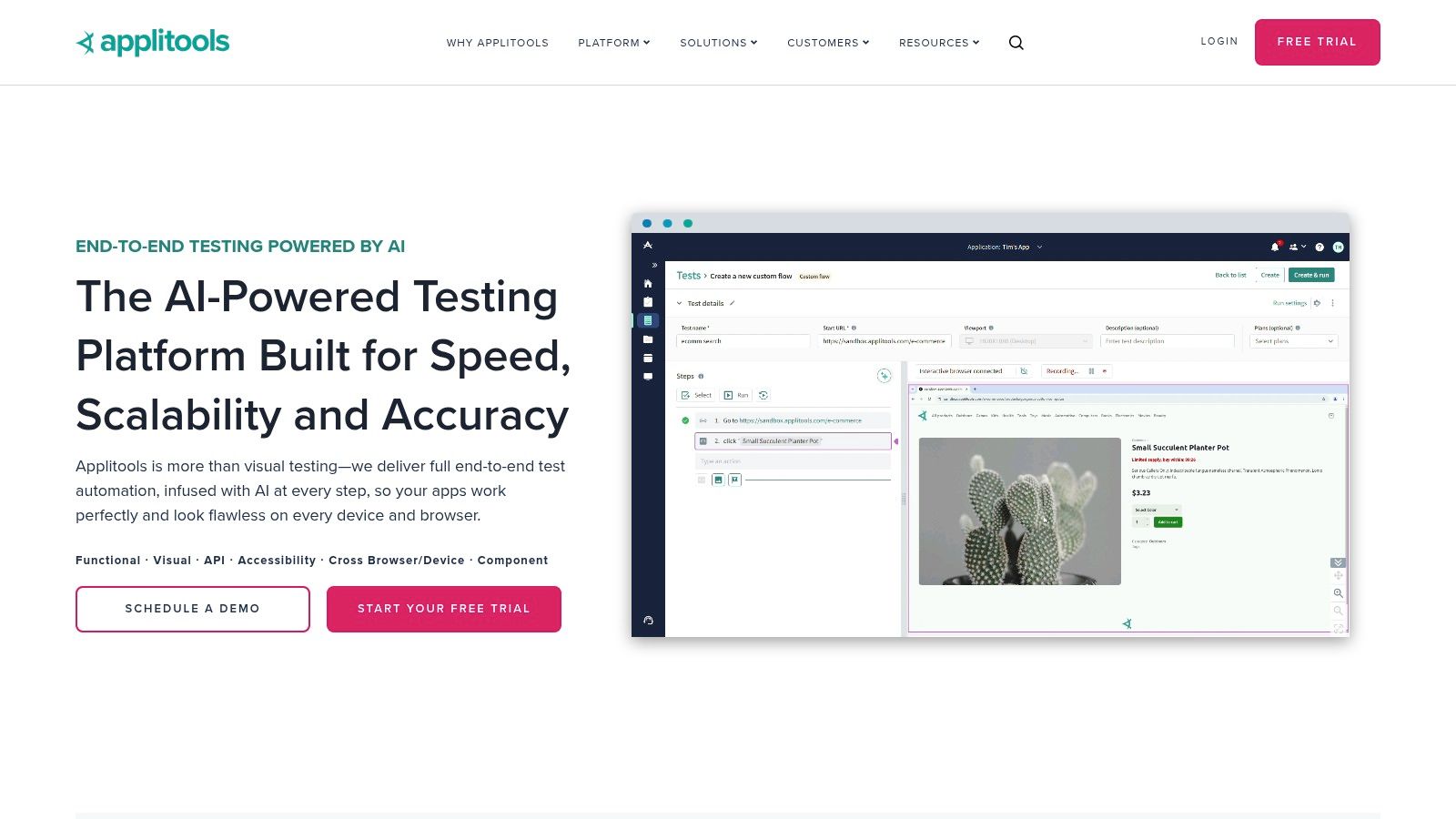
It integrates with frameworks like Appium, Espresso, and XCUITest, augmenting existing test suites with visual checkpoints. Applitools’ Ultrafast Grid can then render and validate these visual tests across a wide range of mobile emulators and browser configurations in seconds, not minutes. This combination allows development teams, especially those working with component-driven frameworks, to validate entire screens with a single line of code, as explored in guides on React Native testing.
Key Details & Use Cases
- Best For: Teams focused on UI/UX perfection and reducing maintenance on brittle functional tests.
- Standout Feature: The Visual AI engine provides root-cause analysis and automated test upkeep, intelligently grouping similar UI changes for rapid review and approval.
- Implementation Tip: Start by adding Applitools visual checkpoints to your most critical user flows to quickly demonstrate value and gain team buy-in before a wider rollout.
- Integrations: Offers SDKs for over 50 test frameworks and seamless integrations with CI/CD tools like Jenkins, GitHub Actions, and CircleCI.
| Feature | Details |
|---|---|
| Frameworks | Appium, Espresso, XCUITest, and 50+ other web and mobile frameworks |
| Device Access | Ultrafast Grid provides extensive mobile emulation and browser coverage; integrates with real device clouds |
| Pros | Significantly reduces test flakiness and maintenance overhead, strong educational resources |
| Cons | Visual AI is complementary and requires separate execution infrastructure, starter pricing is high |
| Pricing | Free account available; paid plans are custom-quoted based on team size and usage. |
Website: https://applitools.com/
12. Digital.ai Continuous Testing (formerly Experitest/SeeTest)
Digital.ai Continuous Testing is an enterprise-grade platform that stands out for its deployment flexibility and security features, making it a strong choice among mobile app testing automation tools for highly regulated industries. It provides comprehensive testing capabilities across functional, performance, and accessibility domains. The platform’s main differentiator is its ability to be deployed either on-premise or in a private cloud, giving organizations complete control over their device labs and data security.
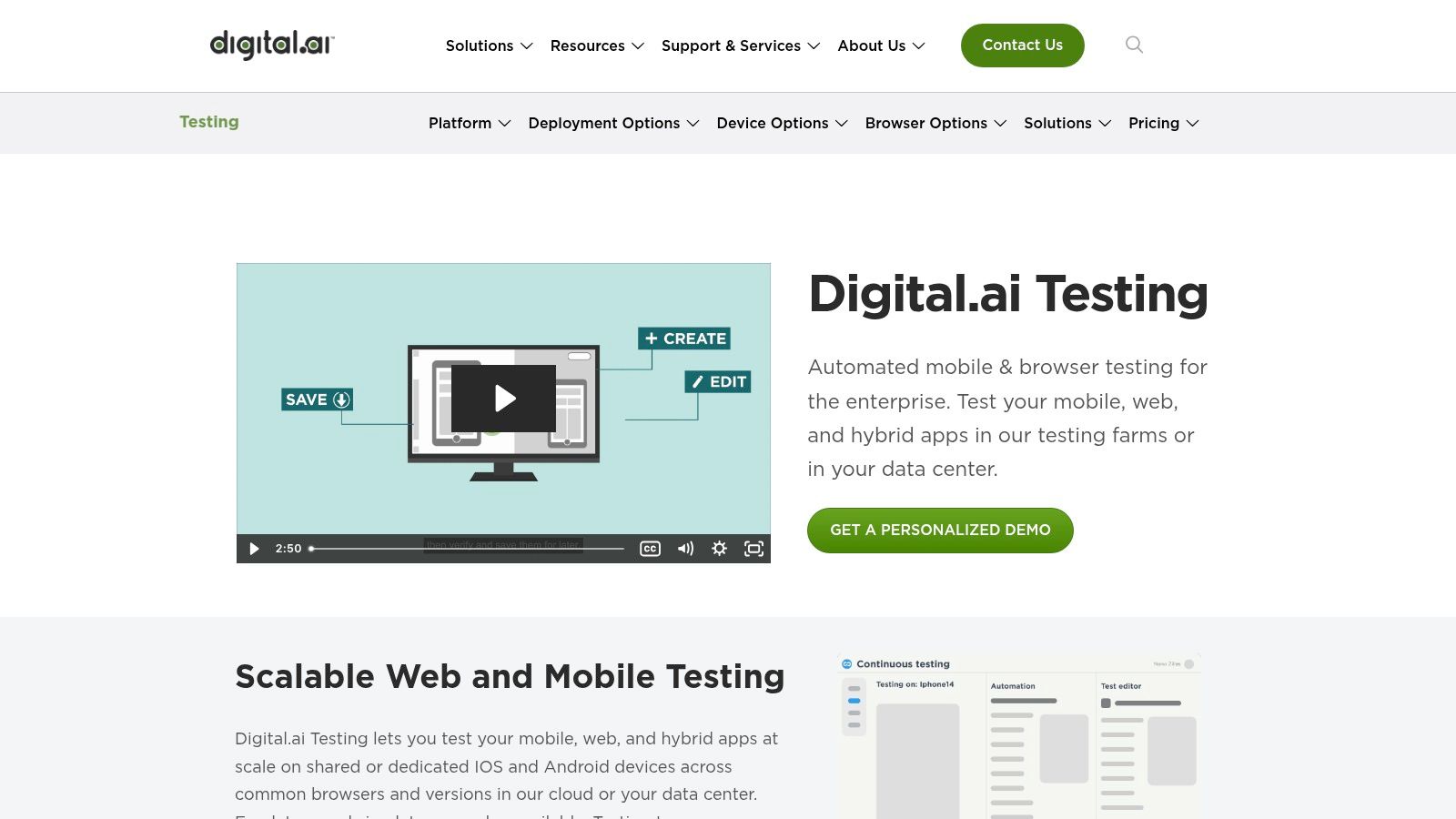
It supports both manual and automated testing on a vast array of real devices and emulators/simulators. Digital.ai also incorporates AI-assisted test creation to help accelerate script development and offers rich analytics dashboards for deep insights into test results and app quality. For organizations that need robust security and flexible lab management, it is one of the more powerful mobile app test automation tools available.
Key Details & Use Cases
- Best For: Large enterprises, particularly in finance or healthcare, that require on-premise or private cloud deployment for security and compliance.
- Standout Feature: Flexible deployment models (public cloud, private cloud, or on-premise) that provide total control over the testing environment.
- Implementation Tip: Leverage the platform’s detailed analytics and reporting to track performance and accessibility metrics across releases, not just functional test pass/fail rates.
- Integrations: Connects with major CI/CD tools like Jenkins, Azure DevOps, and Bamboo, as well as ALM platforms like Jira.
| Feature | Details |
|---|---|
| Frameworks | Appium, Espresso, XCUITest, Selenium |
| Device Access | Real and virtual devices with shared, private, or on-premise lab options |
| Pros | Strong platform suited for regulated and secured enterprise environments, flexible device lab management |
| Cons | Pricing is not transparent and requires a sales quote, implementation can be heavy for smaller teams |
| Pricing | Available upon request; custom enterprise plans. |
Website: https://digital.ai/products/continuous-testing/
Top 12 Mobile App Testing Automation Tools Comparison
| Platform | Core Features/Characteristics | User Experience/Quality ★ | Value Proposition 💰 | Target Audience 👥 | Unique Selling Points ✨ |
|---|---|---|---|---|---|
| 🏆 CodePushGo | Instant OTA React Native updates, E2E encryption, API | ★★★★★ | One-time setup + monthly ~$300 | React Native devs & teams🏅 | Smart diff updates, instant rollout, rollback |
| BrowserStack – App Automate | 30,000+ devices, Appium, Espresso, XCUITest support | ★★★★☆ | Usage-based, can get costly 💸 | Mobile app testing teams | Massive device coverage, parallel runs |
| Sauce Labs | Real + virtual devices, network capture, crash reports | ★★★★☆ | Enterprise pricing, sales contact | Enterprise QA teams | AI diagnostics, compliance focus |
| AWS Device Farm | Pay-per-minute, private devices, AWS ecosystem integration | ★★★★ | Cost-effective for spikes | Scalable cloud users | Flexible pricing, AWS toolchain integration |
| Firebase Test Lab | Virtual & physical devices, free quotas, Android-focused | ★★★★ | Highly cost-effective on Android | Android developers | Tight Google Cloud & Firebase integration |
| SmartBear BitBar | Unlimited test minutes, parallel execution, TestComplete | ★★★☆☆ | Predictable unlimited pricing | SmartBear ecosystem users | Unlimited minutes, private clouds options |
| Perfecto by Perforce | Real/virtual devices, scriptless testing, accessibility | ★★★★☆ | Enterprise tiers, higher cost | Large enterprises | AI-assisted analytics, visual validations |
| LambdaTest | Real devices + emulators, CI/CD & debugging integrations | ★★★☆☆ | Affordable entry plans | Cost-conscious teams | Combined web & mobile testing |
| Kobiton | AI-driven scriptless & scripted tests, cloud/on-premise | ★★★★ | Flexible plans, sales for enterprise | Varied team sizes | AI no-code tests, robust integrations |
| HeadSpin | Functional + performance testing, network capture | ★★★★☆ | Variable pricing, some add-ons | Performance-focused enterprises | KPI dashboards, IoT & media test support |
| Applitools | Visual AI testing, Ultrafast Grid, root-cause analysis | ★★★★☆ | Higher starter costs | Teams needing visual testing | Visual AI, flaky test reduction |
| Digital.ai Continuous Testing | Enterprise-grade, AI-assisted tests, cloud/on-premise | ★★★★ | Sales-only pricing | Regulated enterprise environments | Accessibility, performance, AI test creation |
Making Your Final Choice: The Path to Smarter Mobile Testing
Navigating the landscape of mobile app testing automation tools can seem complex, but making an informed choice is a critical strategic decision. The right platform will not only accelerate your development cycles but also significantly elevate your app’s quality, stability, and user satisfaction. Your final decision should be a reflection of your team’s unique context and long-term goals.
As we’ve explored, the market offers a diverse range of solutions. Enterprise-grade platforms like BrowserStack, Sauce Labs, and Perfecto provide extensive real device clouds and advanced features, making them ideal for large organizations with complex testing matrices. Conversely, teams deeply integrated into specific cloud ecosystems will find immense value and cost-efficiency in services like AWS Device Farm and Google’s Firebase Test Lab, which offer seamless CI/CD integration.
How to Select the Right Tool for Your Team
Choosing the best tool isn’t about finding a one-size-fits-all solution; it’s about identifying the perfect fit for your specific needs. Before committing, your team should carefully evaluate the following factors:
- Team Skillset: Does your team excel with specific frameworks like Appium or XCUITest, or would a low-code or scriptless solution like Kobiton be more effective? Select a tool that lowers the barrier to entry and empowers your existing QA and development talent.
- Integration and Workflow: How well does the tool integrate with your current CI/CD pipeline (e.g., Jenkins, CircleCI, GitHub Actions)? A tool that fits naturally into your workflow will see much higher adoption and deliver greater ROI.
- Application Complexity: Are you primarily focused on functional testing, or do you require advanced capabilities like performance monitoring (HeadSpin), visual regression testing (Applitools), or comprehensive security analysis? Match the tool’s specialty to your app’s primary quality drivers.
- Budget and Scalability: Define your budget clearly. While some tools offer flexible pay-as-you-go models, others require significant upfront investment. Consider not only your current needs but also how the tool’s pricing will scale as your testing demands grow.
A Holistic Approach to Mobile App Quality
Ultimately, effective mobile testing is about more than just finding bugs; it’s about resolving them swiftly and efficiently. This is where a holistic strategy becomes invaluable. While the mobile app testing automation tools discussed help you identify issues with precision, your ability to act on those findings is equally important.
For React Native developers, this means pairing a robust testing suite with an agile deployment solution. Imagine your automated tests on BitBar or LambdaTest flag a critical UI bug. Instead of waiting days for a traditional app store review cycle, a tool like CodePushGo allows you to deploy a hotfix directly to your users’ devices in minutes. This powerful combination creates a rapid feedback loop: find bugs faster with automation and fix them instantly, ensuring a continuously improving user experience.
Once your rigorous testing process confirms your app is polished and ready, the final step is navigating the submission process. For a detailed walkthrough, this step-by-step guide to publishing your app to the App Store can help ensure a smooth launch. By choosing the right tools and adopting a comprehensive quality strategy, you empower your team to not just build good apps, but to maintain exceptional ones.
Ready to close the loop between testing and deployment? While automation tools find the bugs, CodePushGo lets you fix them instantly for your React Native apps. Skip the app store review wait and deliver hotfixes in minutes by signing up for a free trial at CodePushGo today.




